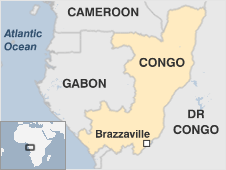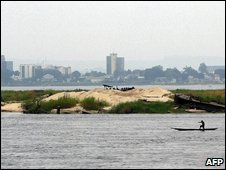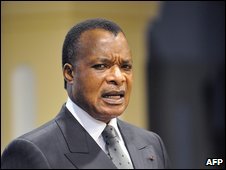After three
coup-ridden
but relatively
peaceful
decades of
independence,
the former
French colony
experienced
the first of
two
destructive
bouts of
fighting when
disputed
parliamentary
elections in
1993 led to
bloody,
ethnically-based
fighting
between
pro-government
forces and the
opposition.

Overview
A ceasefire and the inclusion of some opposition members in the government helped to restore peace.
|
Congo's
capital
Brazzaville
- a port
city on the
Congo river
|
But in 1997 ethnic
and political
tensions exploded
into a full-scale
civil war, fuelled
in part by the prize
of the country's
offshore oil wealth,
which motivated many
of the warlords.

The army split along ethnic lines, with most northern officers joining President Denis Sassou Nguesso's side, and most southerners backing the rebels. These were supporters of the former president, Pascal Lissouba, and his prime minister, Bernard Kolelas, who had been deposed by President Sassou Nguesso in 1997.
By the end of 1999 the rebels had lost all their key positions to the government forces, who were backed by Angolan troops. The rebels then agreed to a ceasefire.
Remnants of the civil war militias, known as Ninjas, are still active in the southern Pool region. Most of them have yet to disarm and many have turned to banditry.
The Republic of Congo is one of sub-Saharan Africa's main oil producers, though 70 percent of the population lives in poverty. Oil is the mainstay of the economy and in recent years the country has tried to increase financial transparency in the sector.
In 2004 the country was expelled from the Kimberley Process that is supposed to prevent conflict diamonds from entering the world supply market. This followed investigations which found that the Republic of Congo could not account for the origin of large quantities of rough diamonds that it was officially exporting.
IMF debt relief to the country was delayed in 2006 following allegations of corruption.
Facts
- Overview
- Facts
- Leaders
- Media
- Full name: Republic of the Congo
- Population: 3.7 million (UN, 2009)
- Capital: Brazzaville
- Area: 342,000 sq km (132,047 sq miles)
- Major languages: French, indigenous African languages
- Major religions: Christianity, indigenous African beliefs
- Life expectancy: 53 years (men), 55 years (women) (UN)
- Monetary unit: 1 CFA (Communaute Financiere Africaine) franc = 100 centimes
- Main exports: Oil, timber, plywood, sugar, cocoa, coffee, diamonds
- GNI per capita: US $1,970 (World Bank, 2008)
- Internet domain: .cg
- International dialling code: +242
Leaders
President:
Denis
Sassou Nguesso
Denis Sassou Nguesso
is one of Africa's
longest-serving
leaders having first
come to power three
decades ago.

Denis Sassou
Nguesso
|
He gained his latest seven-year term after elections in July 2009 which were boycotted by the opposition, and from which the main opposition candidate was excluded.
He was installed as president by the military in 1979 and lost his position in the country's first multi-party elections in 1992.
He returned to power in 1997 after a brief but bloody civil war in which he was backed by Angolan troops.
A French-trained paratroop colonel, Mr Sassou Nguesso is seen as a pragmatist. During his first presidency in 1979-92 he loosened the country's links with the Soviet bloc and gave French, US and other Western oil companies roles in oil exploration and production.
He abandoned the one-party system in 1992, making the ruling Congolese Workers Party (PCT) fight for its political life after more than 20 years as the sole party.
A French judge announced in May 2009 that he would launch a landmark investigation into whether Sassou Nguesso, Omar Bongo, the late president of Gabon, and Equatorial Guinea's President Teodoro Obiang Nguema plundered state coffers to buy luxury homes and cars in France.
A complaint filed by Transparency International France accused the leaders, who deny any wrongdoing, of acquiring millions of dollars of real estate in Paris and on the French Riviera and buying luxury cars with embezzled public money.
Denis Sassou Nguesso was born in a village in northern Congo in 1943. In 2006 he became chairman of the 53-nation African Union.
Media
News broadcasts on state-run radio and television stations generally reflect the government line.
Stations from nearby Kinshasa, in DR Congo, can be received in the capital and rebroadcasts of the BBC, Radio France Internationale, and the Voice of America are available.
A 2001 press law abolished jail sentences for libel and insult, but retained the punishment for incitement to violence and racism.
The newspapers which appear in Brazzaville are all privately-owned. Some of them carry criticism of the government.
The press
- Le Choc - Brazzaville
- L'Observateur - Brazzaville
- L'Humanitaire - Brazzaville
- Le Tam Tam - Brazzaville
- Les Echos du Congo - Brazzaville
- La Semaine Africaine - run by the Catholic church
Television
- TV Congo - operated by state-run Radiodiffusion Television Congolaise
Radio
- Radio Congo - operated by state-run Radiodiffusion Nationale Congolaise
- Radio Brazzaville - state-run station for capital
- Radio Liberte - private
- Canal FM - Brazzaville community station
News agency
-
Agence Congolaise d'Information - state-run
AFRICA | ASIA-PACIFIC | AMERICAS | EUROPE | MIDDLEEAST | SOUTHASIA






Mauritania Mauritius Morocco Mozambique Namibia Niger Nigeria Republic-of-congo Rwanda Sao-tome-and-principe Senegal Seychelles Sierra-leone Somalia South-africa Sudan Swaziland Tanzania The-gambia Togo Tunisia Uganda zambia Zimbabwe Australia Brunei Burma Cambodia China East-timor Fiji Indonesia Japan Kazakhstan Kiribati Kyrgyzstan Laos Malaysia Marshall-islands Micronesia Mongolia Nauru New-zealand North-korea Palau Papua-new-guinea Samoa Singapore Solomon-islands South-korea Taiwan Tajikistan Thailand The-philippines Tonga Turkmenistan Tuvalu Uzbekistan Vanuatu Vietnam Antigua-and-barbuda Argentina Bahamas Barbados Belize Bolivia Brazil Canada Chile Colombia Costa-rica Cuba Dominica Dominican-republic Ecuador El-salvador Grenada Guatemala GuyanaHaiti Honduras Jamaica Mexico Nicaragua Panama Paraguay Peru St-kitts-and-nevis St-lucia St-vincent-and-the-grenadines Suriname Trinidad-and-tobago United-states-of-america Uruguay Venezuela Albania Andorra Armenia Austria Azerbaijan Belarus Belgium Bosnia-hercegovina Bulgaria Croatia Cyprus Czech-republic Denmark Estonia Finland France Georgia Germany Greece Hungary Iceland Ireland Italy Latvia Liechtenstein Lithuania Luxembourg Macedonia Malta Moldova Monaco Montenegro Norway Poland Portugal Russia San-marino Serbia Slovakia Slovenia Spain Sweden Switzerland The-netherlands Turkey Ukraine United-kingdom Vatican Algeria Egypt Iran Iraq Israel-and-palestinian-territories Jordan Kuwait Lebanon Libya Mauritania Oman Saudi-arabia Sudan Syria Tunisia United-arab-emirates Yemen Afghanistan Bangladesh Bhutan India Nepal Pakistan Sri-Lanka The-Maldives

